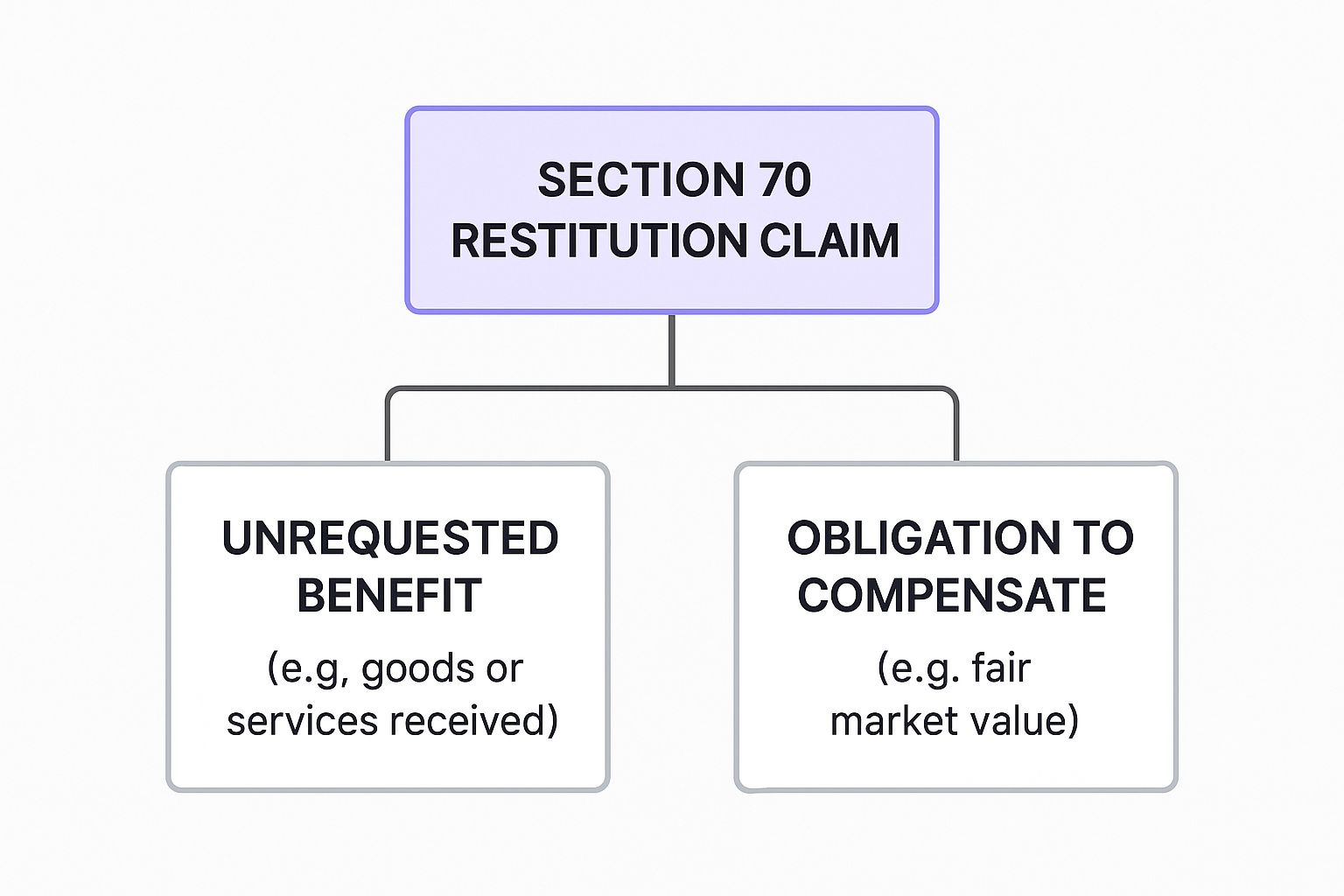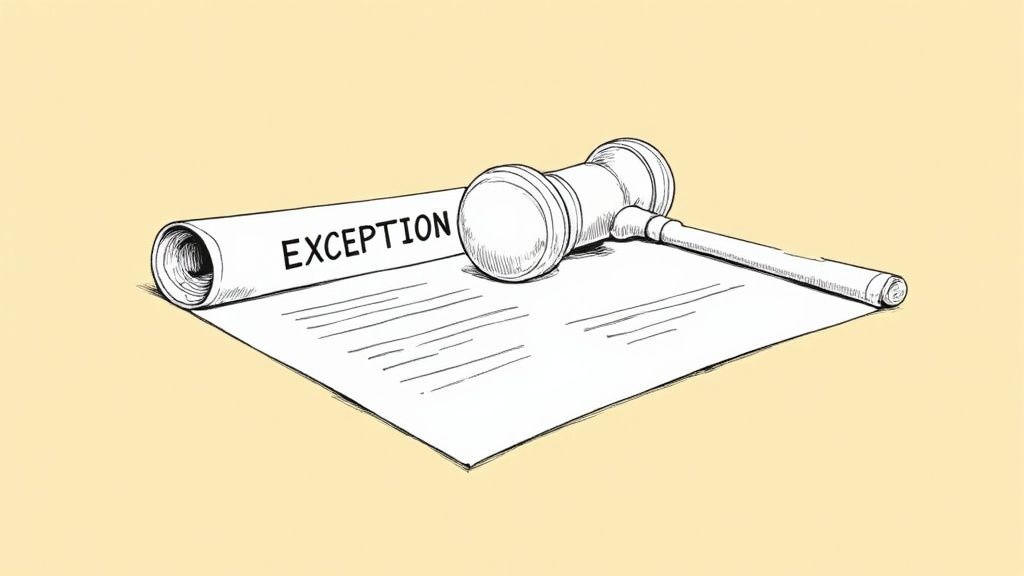Understanding Section 70 of Indian Contract Act
- Rare Labs
- Oct 5, 2025
- 15 min read
Picture this: you've done some work for someone, or delivered goods, and they’ve benefited from it. But there’s no formal, written contract to back you up. What happens then? This is where Section 70 of the Indian Contract Act, 1872, steps in. It’s a crucial legal safety net that stops one person from unfairly profiting at another's expense when a formal agreement is missing.
At its heart, Section 70 establishes an obligation to pay for "non-gratuitous acts"—a fancy way of saying things done with the expectation of being paid. This forms the basis of quasi-contracts, ensuring fairness even without a signed piece of paper. This principle, often called preventing unjust enrichment, is a real cornerstone of Indian civil and commercial law.
Demystifying Unjust Enrichment Under Section 70

Let’s break it down with a simple, everyday scenario. Imagine you hire a painter to paint your living room. While on the job, he notices a leaky window frame that’s about to cause some serious water damage. He quickly repairs it to prevent a bigger problem. You see him doing this extra bit of work and don't object; in fact, you're relieved it's been handled.
Even though your original contract was only for painting, section 70 of Indian Contract Act ensures the painter can claim a reasonable payment for the window repair. Why? Because he performed a lawful act not intending to do it for free, and you willingly accepted the benefit.
This is what Section 70 is all about. It creates a legal duty to compensate someone for something they’ve done for you, which you knew wasn't a gift and which you chose to enjoy. It’s a powerful tool that fills the gaps where formal agreements are silent, making sure things stay fair.
The Core Principle of Quasi-Contracts
It's important to understand that Section 70 isn't about enforcing a non-existent contract. Instead, it’s about preventing one party from getting something for nothing, unfairly. The law basically imposes a contract-like obligation—what we call a "quasi-contract"—to achieve a just outcome. This is incredibly relevant in the business world, where services often kick off based on a handshake or verbal understanding long before the final paperwork is sorted.
The thinking behind Section 70 is deeply connected to India’s social and economic fabric, where informal agreements are incredibly common. This legal provision is a lifeline for India’s vast informal sector, which, believe it or not, accounts for roughly 80% of employment. By bridging the gaps left by a lack of formal contracts, it acts as a vital instrument for economic fairness. You can dive deeper into this impact on Indian contractual relations.
InsightsGetting to grips with Section 70 is essential for anyone providing goods or services. It’s your protection when someone accepts and uses your work, even if the formal agreement is still pending. It’s a remedy rooted in fairness, not just paperwork.
For legal professionals trying to navigate these situations, a specialised tool like Draft Bot Pro can be a game-changer. This Legal AI can help you quickly assess whether the facts of a case meet the criteria for a Section 70 claim, pull up relevant case law, and even draft a precise legal notice. It helps ensure your arguments are built on solid legal ground from the get-go.
The Three Pillars of an Unjust Enrichment Claim
For any claim under section 70 of the Indian Contract Act to hold up, it needs to be built on a solid foundation of three essential legal requirements. Think of them as three pillars – if even one is missing, the whole structure comes crashing down.
To really get a grip on how this works, it’s best to start with the words of the law itself. The language in the Act is the blueprint for these pillars.
"Where a person lawfully does anything for another person, or delivers anything to him, not intending to do so gratuitously, and such other person enjoys the benefit thereof, the latter is bound to make compensation to the former in respect of, or to restore, the thing so done or delivered."— Section 70, Indian Contract Act, 1872
This single sentence is packed with meaning, laying out the three core conditions that courts will look at under a microscope in any claim of unjust enrichment.
The First Pillar: Lawful Action
The very first condition is straightforward: the act performed or the item delivered must be lawful. You can't use Section 70 to get compensated for doing something illegal. This is a crucial safeguard, ensuring the law doesn't end up rewarding behaviour it's designed to prohibit.
For example, if someone pays a bribe on another person's behalf and then tries to use Section 70 to get that money back, the claim would fail instantly. The initial act was unlawful. The law is there to ensure fairness in legitimate dealings, not to sort out the fallout from illegal ones.
This infographic breaks down the basic idea of how getting an unrequested benefit creates an obligation to pay for it under Section 70.

As you can see, the moment a benefit is received, a legal duty to provide fair compensation kicks in. That's the heart of a restitution claim.
The Second Pillar: Non-Gratuitous Intention
Next up, the person who performed the act must not have intended to do it for free. This is the non-gratuitous element. The law draws a very clear line between a gift given freely and a service rendered with a reasonable expectation of being paid.
Think about a caterer who drops off a tasting platter for a potential client planning a big wedding. The caterer isn't just giving away food out of the goodness of their heart; it’s a business move. If the client polishes off the entire platter, they've accepted a benefit that was obviously not meant as a gift. In that case, a claim for reasonable compensation would be on solid ground.
The Third Pillar: Enjoyment of the Benefit
Finally, the other party must have actually enjoyed the benefit of the act or the item delivered. This is a critical point because it hinges on voluntary acceptance. You can't be forced to pay for something that was just thrust upon you, especially if you had no chance to say "no, thanks."
Let's say a contractor is paving your neighbour's driveway and accidentally extends it a few feet onto your property while you're out. You probably wouldn't be liable because you had no opportunity to object. But if you stand there, watch them do it, and say nothing, your silence could be seen as acceptance. You've "enjoyed the benefit," and the situation changes entirely.
Let's break these three core conditions down into a simple table to see how they work together.
Core Conditions for Invoking Section 70
Essential Ingredient | Explanation | Simple Example |
|---|---|---|
Lawful Act | The action taken or item delivered must be permitted by law. You can't claim compensation for an illegal activity. | A painter accidentally paints your fence instead of your neighbour's. This is a lawful act. |
Non-Gratuitous Intent | The person performing the act must have intended to be paid for it. It wasn't meant to be a free gift or favour. | A professional window cleaner washes your shop's windows, assuming it's part of a commercial contract. |
Enjoyment of Benefit | The person receiving the benefit must have accepted it, either explicitly or by their actions (or inaction). | You see the window cleaner and let them finish, knowing they expect payment. You've enjoyed the benefit. |
Grasping these three pillars is fundamental for anyone on either side of a Section 70 claim.
InsightsBefore you even think about sending a legal notice or defending against a claim, you have to honestly assess the facts. Does your case clearly establish that the act was lawful, the intention wasn't gratuitous, and the benefit was voluntarily enjoyed? If the answer to all three isn't a firm "yes," you've got a problem.
When it comes to drafting a legal notice or a claim based on these principles, precision is everything. A Legal AI tool like Draft Bot Pro can be a huge help in structuring your arguments, making sure each of these three pillars is clearly articulated and backed up by the facts. This kind of systematic approach can seriously strengthen your legal position right from the start.
Landmark Judgments That Shaped the Law
Legal principles on paper are one thing, but their real power comes from how judges interpret them in the courtroom. For section 70 of the Indian Contract Act, a handful of landmark judgments have been absolutely crucial. They’ve defined its scope, clarified how it works, and cemented its role in preventing one party from unfairly benefiting at another's expense.
These cases are the context that turns a piece of legislation into a living, breathing legal remedy.

By digging into the court's reasoning in these pivotal cases, we can get a much better feel for what it actually takes to prove concepts like 'lawful act' and 'enjoyed benefit'. For any practitioner, this analysis is vital for building a strong claim or a solid defence.
State of West Bengal v B.K. Mondal & Sons (1962)
If there's one case you need to know on this topic, it’s State of West Bengal v. B.K. Mondal & Sons. This case tackled a massive question: can the government be held liable under Section 70 even if there isn't a formal, properly executed contract in place, as government rules usually require?
The Supreme Court’s answer was a clear and resounding "yes."
The Court established that the government isn't above the principles of unjust enrichment. If a government body knowingly accepts and enjoys the benefit of work done or goods supplied, it can't just hide behind procedural red tape to avoid paying up. This judgment drove home the point that Section 70 is all about equity and justice, making sure that even the State can't get a free lunch at a citizen's expense.
Kanhaya Lal v National Bank of India (1913)
Another foundational case is Kanhaya Lal v. National Bank of India. This one shows how Section 70 plays out in a commercial situation involving a simple mistake. It set the precedent that if goods are delivered to someone by mistake and they go ahead and use them, they are on the hook to pay for them.
The court in Kanhaya Lal held that the bank had to compensate for goods it mistakenly received and consumed. The principles from this case, and later cemented by the B.K. Mondal ruling, make it clear that the core of Section 70 is about fairness, not just contractual formalities. The 1962 B.K. Mondal decision, in particular, broadened the practical reach of Section 70, ensuring governmental bodies couldn't unfairly benefit without payment either.
InsightsThe big takeaway from these judgments is simple: the courts consistently look past the lack of a formal contract to see what actually happened. The real test for a Section 70 claim comes down to the conduct of the parties—was a benefit voluntarily accepted and enjoyed? That's the question that matters.
Leveraging Legal AI for Case Law Analysis
For any lawyer or law student, sifting through decades of judicial interpretation is a monumental task. This is exactly where a Legal AI like Draft Bot Pro becomes an indispensable ally. It can instantly take the facts of your case and cross-reference them with the principles set out in these foundational judgments.
By using an advanced case law research tool for Indian courts, you can quickly find precedents that back up your position. Draft Bot Pro helps you zero in on the exact judicial reasoning from cases like B.K. Mondal that mirrors your client’s situation. This saves countless hours of manual research and puts you on a much stronger footing from the very beginning.
Putting Section 70 to the Test: Real-World Scenarios
Legal theory is one thing, but seeing how Section 70 of the Indian Contract Act plays out in the real world is where its true value becomes clear. This principle isn't just for textbooks; it pops up all the time in everyday business, especially when things move fast and the paperwork can't keep up.
Let's walk through a couple of relatable examples. You'll quickly see how a simple, fair idea can solve some messy disputes.

In both of these stories, pay close attention to how those three essential ingredients we talked about—a lawful act, expecting to be paid, and the other person enjoying the benefit—come together. Once you can spot this pattern, you’ll know exactly when you have a right to be paid for your work.
The Urgent Foundation Repair
Picture this: a contractor is hired to renovate the ground floor of a commercial building. In the middle of the job, they find a massive crack in the foundation. It's a serious problem that needs to be fixed immediately to keep the building safe.
The contractor calls the property owner, explains the emergency, and the owner says over the phone, "Okay, do what you need to do to fix it." So, the contractor gets the urgent foundation work done.
But when the bill comes, the owner refuses to pay for the extra work. Their argument? "It wasn't in the original written contract." This is a classic Section 70 situation.
Let's break it down using our three-point checklist:
Lawful Act? Absolutely. The foundation repair was a legitimate and necessary construction job.
Done for Free? No way. The contractor is a professional business; they clearly intended to get paid for a major, unplanned repair.
Benefit Enjoyed? Yes. The owner knew about the work, gave the verbal go-ahead, and now has a safe, stable building because of it.
All three boxes are ticked. Even without a formal amendment to the contract, the contractor has a solid claim for fair payment for the foundation work.
The Extra Logo Variations
Here’s another one. A graphic designer is hired by a startup to create three logo concepts. The designer gets a burst of inspiration and ends up creating five different variations. They send all five over to the client for review.
The client doesn't say a word about the extra two designs. But a week later, they start using one of those extra, un-scoped logos on their website and social media.
When the designer sends an invoice for the additional design work, the client pushes back, saying, "We only agreed to pay for three options."
InsightsThis story really shines a light on the 'enjoyment' part of the rule. By actually using the extra logo, the client accepted the benefit. Their actions spoke louder than their silence, creating a clear duty to pay the designer under Section 70.
Again, the designer's claim holds up perfectly. The client chose to use something they knew wasn't a gift, and in doing so, they created a quasi-contractual obligation to pay for the designer's extra effort.
For legal professionals navigating these kinds of disputes, the entire case hinges on proving these three points. This is where a Legal AI tool like Draft Bot Pro can be a huge help. You can feed it your case notes and emails, and its AI can help you structure a legal notice that clearly lays out how the other party’s actions satisfy each requirement of Section 70. It helps you save time and build a stronger initial claim for your client.
Section 70 And Existing Contracts: Navigating The Overlap
One of the biggest points of confusion is how section 70 of the Indian Contract Act interacts with a formal, written contract. Let's be clear: Section 70 isn't a magic wand you can wave to rewrite or get around the terms of a perfectly valid agreement you've already signed.
The best way to think about Section 70 is as a safety net or a gap-filler. Its real job is to step in and provide a fair remedy when a contract is silent on a particular issue, turns out to be invalid for some reason, or when someone does work that falls completely outside the agreed-upon scope. It only comes into play where the contract leaves a void.
When The Contract Is King
If you have a legally binding contract that clearly lays out the terms for payment, services, or damages, those clauses will always win. You can't use the principle of unjust enrichment to argue against what you and the other party explicitly agreed to. In the eyes of the law, the contract is the supreme law governing your relationship.
A recent Supreme Court judgment drives this point home. In a significant 2023 ruling, the Court was crystal clear: Section 70 claims cannot be used to sidestep specific contractual clauses. In that case, a liquidated damages clause limited MTNL’s liability to a 12% cap, and the Court upheld it, blocking a separate Section 70 claim. This is a powerful reminder that when a binding contract exists, its terms will be enforced. You can read more on how this ruling limits claims under Section 70 when a binding contract is in place.
InsightsThe courts won't let a party use Section 70 to escape a bad bargain or try to claim more money than what was contractually agreed. If your contract has a clear payment or damages clause, that's what a court will look at—not a separate plea for "reasonable compensation."
So, When Can Section 70 Fill The Gaps?
If a contract is already in place, when does Section 70 even apply? It’s designed for very specific situations:
Invalid Contracts: Imagine a contract is declared void or can't be enforced due to a technicality. Section 70 can step in to make sure the party who already provided services still gets paid.
Acts Outside The Scope: This happens when extra work is performed that wasn't covered by the original contract, and the other party knowingly accepts and benefits from it.
Silent Contracts: If the contract simply doesn't mention payment terms for a particular, unforeseen service that was rendered and accepted, Section 70 can provide a basis for compensation.
Telling the difference between a simple breach of contract and a situation where a Section 70 claim might be valid can get tricky. This is where modern legal tools can make a huge difference. For example, the Legal AI Draft Bot Pro helps legal professionals conduct a meticulous AI-powered review and analysis of contracts to pinpoint those exact gaps or ambiguities where a quantum meruit claim might just hold up.
Building Your Legal Strategy with Draft Bot Pro
Knowing the ins and outs of Section 70 of the Indian Contract Act isn't just about acing a law school exam on quasi-contracts. In the real world, it's about building a proactive legal strategy. A solid grasp of this principle helps you draft stronger, more airtight contracts that spell out scope and payment terms with absolute clarity. This alone can slash the risk of future fights over non-gratuitous acts.
But let's be realistic—disputes still happen. When they do, having the right technology in your corner can make all the difference. This is where a Legal AI tool like Draft Bot Pro really shines.
Nailing Your Section 70 Claims
Picture this: a client walks in with a textbook Section 70 problem. Instead of sinking hours into manual drafting and digging through case law, you can get the ball rolling immediately. The Legal AI Draft Bot Pro helps you whip up precise legal notices that specifically invoke Section 70, fast.
The platform can also sanity-check your case facts against the three essential pillars of a valid claim: a lawful act, non-gratuitous intent, and the other party enjoying the benefit. It's like having a second pair of eyes ensuring your arguments are solid from the get-go.
InsightsWinning a Section 70 claim often comes down to the precedents you can pull out of your hat. Being able to instantly summon landmark rulings like State of West Bengal v. B.K. Mondal & Sons gives your arguments the judicial weight they need to land a punch.
Supercharging Your Legal Research
Beyond drafting, Draft Bot Pro lets you instantly pull up relevant case law to back up your arguments. This quick access to precedent puts you in a much stronger position, whether you're trying to negotiate a settlement or gearing up for a courtroom battle.
This Legal AI can help you create expert legal memos, making sure your entire strategy is built on a rock-solid foundation of deep research and analysis. By applying modern tech to a foundational legal principle, you're not just working faster; you're seriously upping the odds of a win for your client.
Your Questions About Section 70, Answered
When you get into the nitty-gritty of section 70 of the Indian Contract Act, a few practical questions always pop up. Let's tackle some of the most common ones that lawyers and business owners run into.
What If Someone Didn't Actually Want The Benefit?
This is a classic scenario, and the law is pretty clear on it. For a claim under Section 70 to stick, the person on the receiving end must have had a real choice to either take the benefit or leave it. You can't just force a service on someone and then send them a bill.
The deciding factor is whether they voluntarily enjoyed the benefit. Think of it this way: a web developer sends you a brilliant website design completely out of the blue. You never asked for it, so you're not on the hook. But, if you then take that design and use it in your company's marketing materials? Well, now you've voluntarily accepted and used the benefit, and that changes everything.
What Kind of Compensation Can You Actually Claim?
The compensation here isn't about lost profits or what a contract might have said. Instead, it's based on a legal principle called quantum meruit — a Latin phrase that simply means "as much as he has deserved."
The court's job is to figure out a fair and reasonable price for the goods delivered or the work done. The whole point is to restore the person who provided the service to their original position, not to penalise the one who received the benefit. It's about preventing one person from being unfairly enriched at another's expense.
InsightsIt's crucial to distinguish between damages you'd get from a broken contract and a claim under Section 70. This section is purely about fair value for the work performed. It ensures the compensation is just, not punitive, and isn't based on some imaginary profit margin from a contract that never existed.
Is There a Deadline to File a Section 70 Claim?
Yes, absolutely. You can't wait forever. Any claim brought under Section 70 falls under the purview of the Limitation Act, 1963. If you've done something for someone non-gratuitously, you need to act fast to get compensated.
As a rule of thumb, you have three years to file a suit. This clock starts ticking from the date the goods were handed over or the service was completed. Time is of the essence, so don't delay. If you're nearing this deadline, using a Legal AI like Draft Bot Pro can help you quickly prepare the necessary paperwork to initiate a claim, ensuring you don't miss the statutory window.
Struggling to frame your legal arguments or draft precise notices? Let the Legal AI Draft Bot Pro give you a hand. Our AI-powered platform helps you analyse case facts against the core principles of Section 70, find supporting case law, and draft compelling legal documents in minutes. See how we can support your practice at https://www.draftbotpro.com.